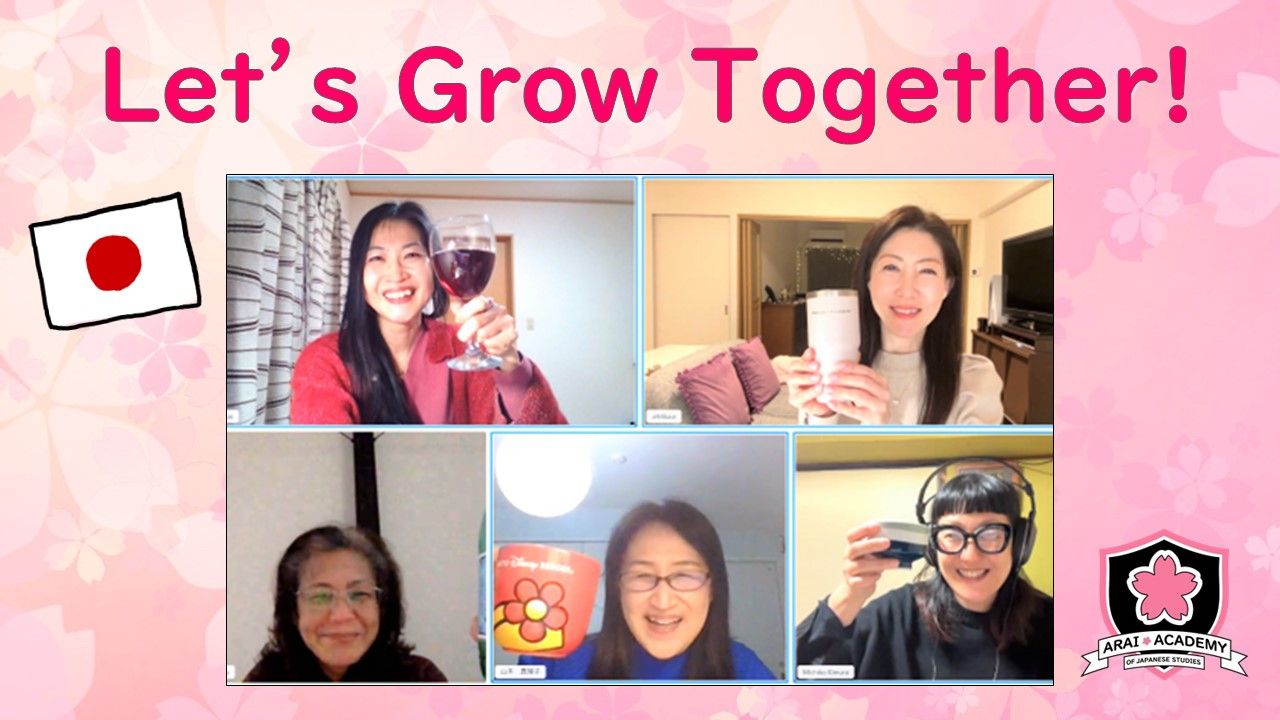Effective Language Learning & Teaching - from our Japanese Teacher Meeting
Feb 05, 2025
Arai Academy of Japanese Studiesの先生方との新年会で、言語教育についてのアプローチについて話しました。ぜひ、みなさんの言語学習、言語教育にお役に立てたら嬉しいです。
We talked about our approach to language teaching at the New Year's party with teachers from the Arai Academy of Japanese Studies. We hope it will be useful for your language learning and teaching.
新人の先生から日本語だけでレッスンした方がいいのかという質問が出ました。子供ならそれでどんどん吸収できるのでいいですね。それから、大人の場合でも中上級の人も日本語だけで理解できるのでいいですね。でも、大人で初級の人には英語(生徒の母語)も使った方がいいという意見になりました。
The new teacher asked if it would be better to give lessons only in Japanese. For children, it is good because they can absorb more and more. Also, for adults, it is good for intermediate and advanced level students as well, as they can understand the lesson in Japanese only. But for adults who are at the beginner level, it is better to use English (the student's native language) as well.
「グループレッスンの場合」
もちろん、日本での語学留学ではグループレッスンが主流で多国籍の生徒が集まるので、日本語だけで教えなければいけません。 これは、初級の生徒たちにとって大変ですね。私も昔アイルランドの英語学校で勉強したんですが、初級なのに英語で全て理解しなくてはいけなかったので、レッスンではほとんどわかりませんでした。
“Group Lessons.”
Of course, if your students are learning the Japanese language by living in Japan, you have to teach only in Japanese because it’s normally group lessons and you have students from many different countries. This is very difficult for beginner students. I have studied at an English school in Ireland as a beginner, I had to understand everything in English, so I could hardly understand anything from the lessons.
「独学や個人レッスンの場合」
今はオンラインでどこでも習えるので、自国で学ぶなら、たいていオンライン教材やアプリで独学するのが主流になってきていますね。独学に追加で時々個人レッスンを受ける人もいると思いますが、当アカデミーの生徒のように毎週個人レッスンで学ぶ人も多くなっています。個人レッスン以外の時間に独学でたくさん勉強しているので、先生とのレッスンではできるだけ話す時間に充てたいというニーズも主流になりました。
それで、今は先生の役目として教えるより話させてあげる時間を多くして上手にフィードバックを与えることがとても大切になっていますね。
“Self-study & One-on-one Lessons.”
Nowadays, you can learn Japanese anywhere online, so if you want to learn in your own country, you usually study by yourself using online materials or apps. Some people might take private lessons occasionally as an option to self-study, but there are also many learners like our students who take weekly private lessons. Today, speaking focused lessons are on demands because they are studying a lot on their own between private lessons.
So it is very important for teachers to spend more time for speaking practice and provide effective feedback rather than teaching expressions.
「コミュニカティブ・アプローチについて」
アプローチに関してですが、今応用言語学で主流のコミュニカティブアプローチは日本語学習なら、生徒の認知力を高めて、基本的に日本語だけで分からせるというものです。
これはインド・ヨーロッパ言語間なら想像力と認知力でなんとか理解できても、ヨーロッパ言語の母語話者が日本語のように極端に違うタイプのアルタイ語を学ぶときにはほとんど想像力すら働かず、かなり理解が難しくなります。実際、私がヨーロッパの人たちに混ざってスペイン語のレッスンに1年参加した時、私だけが日本人で、クラスメイトについていけませんでした。
“About the Communicative Approach”
Regarding the teaching approach, the communicative approach is now the mainstream in applied linguistics. It improves the cognitive skills and basically makes students understand only in Japanese.
It should be possible to understand between Indo-European languages through imagination and cognitive skills. But it can be quite difficult to understand when a native speaker of a European language learns an extremely different type of Altaic language like Japanese, because they can hardly use their cognitive skills and imagination. In fact, when I attended Spanish lessons for a year with a group of European students, I was the only Japanese and could not keep up with the classmates.
実際のコミュニカティブアプローチを支持している研究者や言語教師はインド・ヨーロッパ言語間での教育にかかわっている場合が多いようです。私の生徒のように英語話者が日本語を学ぶ、又は私のように日本語母語話者が英語を学ぶという場合のケーススタディーがあまりないので、実際にはヨーロッパ言語とアルタイ語族間のレッスンでは、私たちの経験上、効果がほとんど感じられていないし、生徒たちも母語の英語を使ってあげると理解が深まるので喜んでくれています。
It seems that researchers and language teachers who support the communicative approach are often teaching between Indo-European languages. Since there are not many case studies of native English speakers learning Japanese, like my students, and native Japanese speakers learning English, like me, we hardly see the benefits from our experience with lessons between a European language and an Altaic languages. Actually, our beginner students are happy to use their native language, English, to deepen their understanding. Therefore, they really enjoy our lessons and are happy.
私たちの経験からの考えをまとめると、子供へ教えるなら日本語だけ十分ですが、大人で初級の場合はその母語での論理的な説明をしてあげることで日本語ができるようになると考えています。また、できるだけ話す時間を作ってあげて効果的なフィードバックをし、心と心がつながるコミュニケーションを楽しんでもらうことが一番ですね!
To summarize our thoughts from our experience, we believe that teaching only in Japanese is effective for children, but for adult beginners, it is important to give them logical explanations in their native language so that they can learn Japanese in depth. Also, it is best to give them time to speak as much as possible, to give them effective feedback, and to let them enjoy heart-to-heart communication!
Succeed in Japanese!
Q: Have you ever learnt how to study Japanese effectively?
Q: Do you feel like you're making progress?
Join our mailing list to receive FREE 'Tips for Achievement!'
We hate SPAM. We will never sell your information, for any reason.




